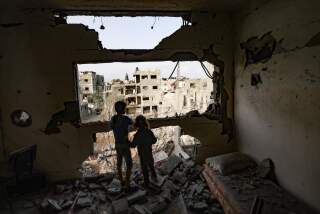Guantanamo inmate stirs debate in Canada
- Share via
TORONTO — Omar Khadr, 20, is an unlikely poster boy for international justice.
When he was 15, the Canadian landed in the U.S. military prison at Guantanamo after allegedly killing an Army medic during fighting in Afghanistan.
For the record:
12:00 a.m. June 28, 2007 For The Record
Los Angeles Times Thursday June 28, 2007 Home Edition Main News Part A Page 2 National Desk 1 inches; 47 words Type of Material: Correction
Guantanamo detainee: An article in Sunday’s Section A about a detainee at Guantanamo Bay, Cuba, reported that the young man, Omar Khadr, is shackled to the floor of his cell in solitary confinement. He is shackled only during meetings in the interview room and during court appearances.
His family has been dubbed “the First Family of Terrorism” in Canada: They lived in Osama bin Laden’s Afghan compound, and his father reportedly helped channel money to Bin Laden’s Al Qaeda terrorist network. Almost every family member has either been killed, wounded, imprisoned or investigated because of suspected terrorist connections.
But for human rights groups, Khadr has become a symbol of what they call the flaws of the U.S. military justice system and Canada’s conciliation.
This month, U.S. military commission judges dropped all charges against Khadr, ruling that military tribunals were for “unlawful enemy combatants” and that he, like all other suspects in Guantanamo, was classified only as an “enemy combatant.”
The Pentagon says it will appeal the decision, and State Department legal advisor John Bellinger said the U.S. believed international law allows it to hold suspects until the end of the conflict in question, even if they are acquitted.
“That means, innocent or not, he may never get out of there,” said Khadr’s lawyer, Dennis Edney. “If it were your child, your heart would break.”
Critics say that the case’s dismissal calls into question the whole legal basis of the tribunals and that Canada should bring Khadr home to be tried. But Foreign Affairs Minister Peter Mackay said the government would wait until “the appeal process has been exhausted” before calling for Khadr’s release.
Now the case of the boy who has come of age in legal limbo has fueled a debate in Canada about whether the government is putting relations with the United States over its willingness to protect its citizens’ rights. The question has evolved from “Is Omar Khadr a terrorist?” to “Why are his rights not worth standing up for?”
“We have raised concerns about Khadr’s case for four years, but this trial highlights how flawed, ad hoc and broken this whole process is,” said Alex Neve, the secretary-general of Amnesty International in Canada. Neve recently released an open letter calling on Prime Minister Stephen Harper to intervene, as other countries have. Britain, France and Germany were successful with demands that their citizens and permanent residents be returned to stand trial, and an Australian detainee, David Hicks, was sent home to serve his sentence.
“Canada is generally reluctant to be too harsh or critical in cases like this because we don’t want to disturb wider U.S.-Canada relations,” Neve said. All Canadians expect their government to ensure their proper treatment if jailed elsewhere, he said, and that includes Khadr. “Canada must make it clear to the U.S. government Omar Khadr must be returned here, where his case will be dealt with fairly.”
The letter’s signers included two former foreign affairs ministers, 25 current and former members of Parliament, and lawyers, academics and representatives of human rights groups.
“We are aware that, setting aside any of Khadr’s own actions, the notoriety of his family makes him unsympathetic in the eyes of some,” the letter said. “But it is plainly unjust to punish the son for the sins of the fathers, or to deny a citizen the protection of his government because of the words or deeds of family members.”
In a militant compound
After four hours of U.S. bombing of an Al Qaeda compound in Afghanistan in July 2002, there was one person left alive in the rubble, the military says -- Khadr. The 15-year-old, fluent in English, Arabic and the local Pashtun dialect, had been sent by his father to interpret for a senior Al Qaeda official. His mother said he was sent without her knowledge and was with the militants against her wishes.
“He was not there to fight,” she said.
But when U.S. troops approached the crumbling wall that shielded him, the military said, Khadr lobbed a grenade, killing Army Sgt. 1st Class Christopher J. Speer and wounding Army Sgt. Layne Morris.
American soldiers found Khadr hemorrhaging from three gunshot wounds in the chest and blinded by shrapnel in one eye.
“Kill me,” he begged in English, according to the soldiers’ accounts. As one American medic lay mortally wounded, another medic saved Khadr’s life. After Khadr recovered, he was shipped to Guantanamo to become the first child in modern history to be charged with war crimes.
At the military prison, he is kept in Camp 6, shackled to the floor in deep solitary confinement. His status as a minor did not bring him any special treatment, and though he joined a hunger strike twice to protest harsh treatment, Canada sent officials to check on his welfare only two or three times.
Khadr’s lawyer, Edney, said he was shocked when he faced his client in person for the first time, a few weeks ago before the trial, after years of petitioning for a visit.
Khadr’s hair and beard have grown long, Edney said, and he has withdrawn deeply into his mind after five years with little human contact.
“No one will touch him,” Edney said. “He is treated like a germ.”
Family ties
Edney said he sees his job in part to bring Khadr back into the world. But there is a larger principle that keeps him working without pay for Canada’s most notorious family.
“Omar was 15. How did he become a terrorist on a battlefield?” Edney asked. “At the end of the day, if there is going to be any finger pointed at Omar Khadr’s being in Afghanistan, it should be at the parents.”
U.S. prosecutors say Khadr was part of a dynasty of terrorism, an intent killer who had been learning to handle weapons since he was 12.
“You’ll see evidence when we get into the courtroom of the smiling face of Omar Khadr as he builds bombs to kill Americans,” said the chief prosecutor, Air Force Col. Morris Davis, citing videotapes allegedly taken at Al Qaeda training camps. “I don’t think it’s a great leap to figure out why we’re holding him accountable. They weren’t making s’mores and learning how to tie knots.”
His father, Ahmed, was an Egyptian-born computer engineer who moved to Pakistan to help support the militants fighting the Russians in Afghanistan, and later, officials allege, became a top aide to Bin Laden.
Ahmed knew Bin Laden well, but he was involved with a charity, not Al Qaeda, said his wife, Maha Elsamnah, 49. He sent his sons for guerrilla training as if it were summer camp.
“It was just to teach them discipline, to keep them out of trouble,” she said. He also taught his sons and daughters about the importance of jihad -- holy war -- and that they should be proud to defend their ideals to the end.
“My father said you have to have a belief, and fight for it, even die for it,” said Omar’s 27-year-old sister, Zaynab, who recalls playing with Bin Laden’s daughters, his attendance at her wedding, and her “awe” at the news of the Sept. 11 attacks. “So that’s what they were planning for the last two years,” she said she remembers thinking.
Conflicting values
Ahmed’s sons listened to their father, and whether or not they joined Al Qaeda, they all are now in some sort of trouble because of the clash between the beliefs of their father and the values of their Canadian homeland.
Ahmed died in an attack on an Al Qaeda compound in Pakistan in 2003; his son Kareem, 14 at the time, was hit in the spine and paralyzed from the waist down. Abdullah, now 26, has been in jail in Toronto for 18 months pending U.S. extradition hearings on charges that he procured weapons for terrorist groups. Omar is in Guantanamo.
A fourth son, Abdurahman, 24, was in Guantanamo until he agreed to work for the CIA as a mole in Bosnia. After his cover was blown there, he returned to Toronto, where he denounced his brothers for their Al Qaeda links.
He now lives uncomfortably with his mother, sisters and paralyzed brother in a modest apartment in the Toronto suburb of Scarborough. While he was at work, his mother and sister Zaynab launched into a long discussion of Abdurahman.
“He’s the one who got Abdullah in trouble,” Zaynab said. “He’s the one who testified against Omar in Guantanamo. He said it to get out of there.”
“He was used!” shouted Maha, his mother.
“He wasn’t used! He agreed to it!” Zaynab shot back.
They fell silent, as they thought of Omar, and their phone conversation with him just a few weeks ago, the first they have been allowed in five years.
“No matter who he is or what he has done,” Zaynab said, “there should be justice for my brother.”
More to Read
Sign up for Essential California
The most important California stories and recommendations in your inbox every morning.
You may occasionally receive promotional content from the Los Angeles Times.













